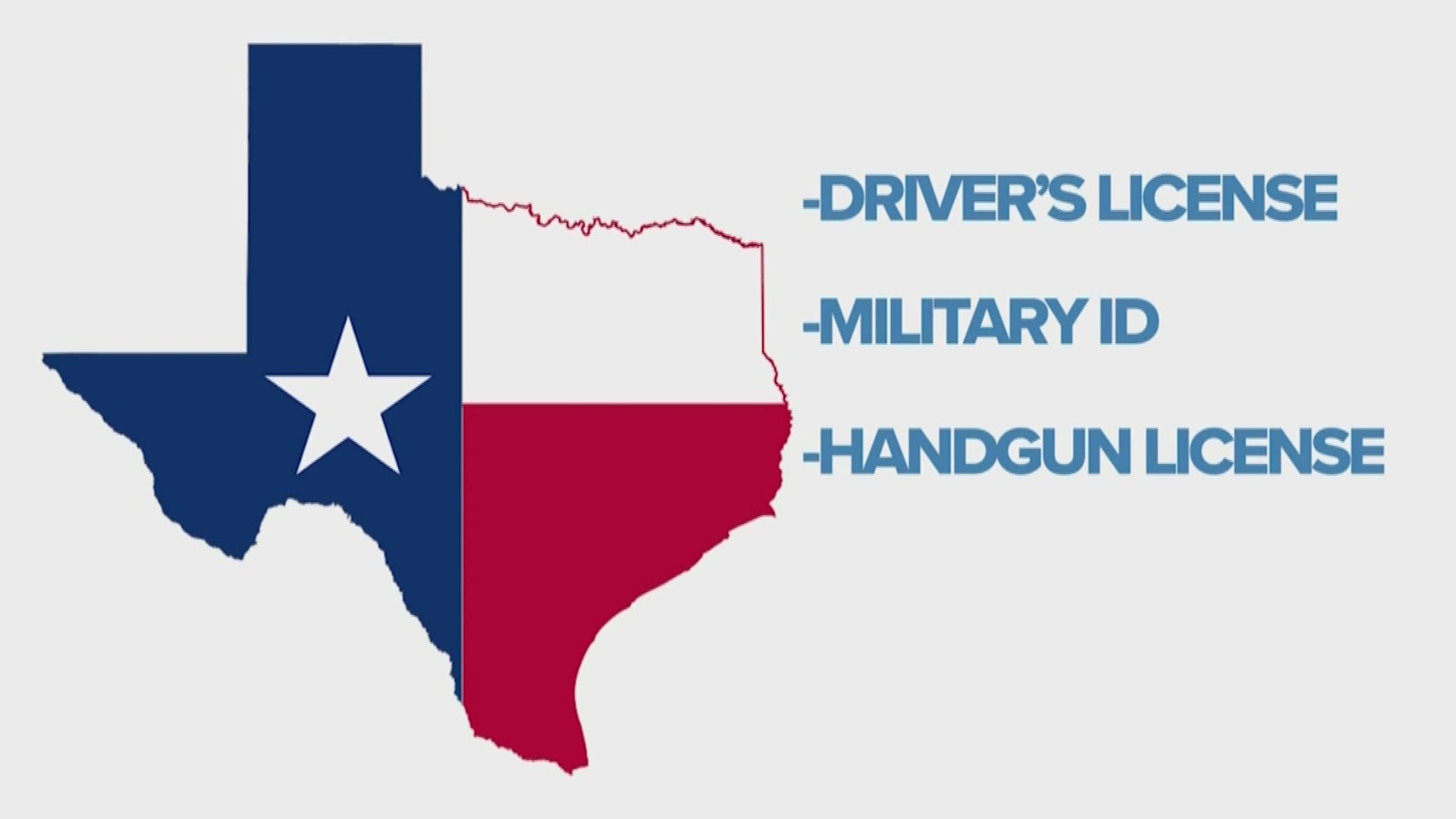Updated March 1 to remove early voting information, add details.
Texans will be voting during the primaries on presidential candidates, U.S. Senate candidates, U.S. representatives, judges and party propositions.
The Democratic and Republican primaries are on March 3, best known as Super Tuesday. Early voting begins Feb. 18 and ends Feb. 28.
Here's what you need to know before you vote:
Am I registered to vote?
You must be registered in order to vote in Texas. You can check online to see if you are currently registered to vote.
When and where you can vote
You will want to see if the county you live in participates in the Countywide Polling Place Program (CWPP). If your county does participate in CWPP, you can vote at any polling place in the county. If your county does not participate in CWPP, you can only vote at the polling place assigned to you.
On March 3, polling places across Texas will be open from 7 a.m. to 7 p.m.
What's on your ballot?
Each party will choose its candidate for U.S. president, U.S. Senate, congressional offices, legislative offices, the State Board of Education, the Railroad Commission and judicial seats.
All Texans will have the opportunity to vote for candidates in statewide races, but other contests will depend on where you live.
For the U.S. House of Representatives, Texas has 36 different congressional districts. At the state level, Texas is divided into 150 House districts, 31 Senate districts and 15 State Board of Education districts.
All U.S. and Texas House districts will have an election this year, as well as one U.S. Senate office – incumbent John Cornyn’s seat – several Texas Senate seats and eight State Board of Education seats.
Since March 3 is a primary election, ballots will be different for Democratic and Republican contests. The parties will also have propositions on the ballot, which in a primary election function more as opinion polls to gauge voter sentiment, not policy referendums.
If none of the candidates in each contest win 50% or more of the vote on March 3, the top two finishers will advance to a May 26 runoff election.
U.S. Senate candidates
There are 12 Democrats running during the primary for the U.S. Senate seat currently held by John Cornyn.
In the Republican primary, Cornyn faces John Anthony Castro, Virgil Bierschwale, Mark Yancey and Dwayne Stovall.
Texas Tribune: With a month to go, crowded Democratic primary to challenge Cornyn remains full of uncertainty
U.S. House candidates
U.S. House - District 24
This district includes northwest Dallas, Carrollton, Coppell, Irving, DFW Airport, Southlake and Colleyville. Incumbent Republican Kenny Marchant is retiring.
Democrats: Kim Olson, Jan McDowell, Crystal Fletcher, John Biggan, Sam Vega, Candace Valenzuela and Richard Fleming.
Republicans: Sunny Chaparala, Beth Van Duyne, Jeron Liverman, David Fegan and Desi Maes.
U.S. House - District 12
This district includes west Fort Worth, Saginaw, Azle, Benbrook and Weatherford. Incumbent Republican Kay Granger is running for re-election. She faces challenger Chris Putnam.
Democrats Danny Anderson and Lisa Welch are also running.
U.S. House - District 32
This district includes East Dallas, North Dallas, University Park, Garland, Sachse and Wylie. Democrat incumbent Colin Allred is running unopposed in his party. Republicans Jon Hollis, Jeff Tokar, Genevieve Collins, Floyd McLendon and Mark Sackett.
U.S. House - District 6
This district includes Arlington, Mansfield, Midlothian, Waxahachie and Ennis. Republican incumbent Ron Wright is unopposed in his party. Stephen Daniel is the sole Democrat running for the seat.
U.S. House - District 26
This district includes Denton, Lewisville, Highland Village, Flower Mound and Keller. Republican incumbent Michael C. Burgess will face Michael Armstrong, Jack Wyman and Jason Mrochek. Democrats Mat Pruneda, Carol H. Iannuzzi and Neil Durrance.
U.S. House - District 33
This district includes east Fort Worth, northern Arlington, north Grand Prairie, southern Irving, West Dallas and north Oak Cliff. Democrat incumbent Marc Veasey faces Sean Paul Segura. Republican Fabian Cordova Vasquez is also vying for the seat.
U.S. House - District 30
This district includes parts of East Dallas, South Dallas, Cedar Hill, DeSoto, Duncanville, Hutchins and Lancaster. Democrat incumbent Eddie Bernice Johnson faces challengers Shenita "Shae" Cleveland, Barbara Mallory Caraway and Hasani Burton. Republican Tre Pennie is also running. If re-elected, Johnson will enter her 15th term as a U.S. Representative.
Sample ballots
Want to know what will be on your ballot before you head into the voting booth? Good news — you can. Counties share sample ballots ahead of elections to allow voters to see what options they'll have. Below is a list of links to sample ballots for counties across North Texas.
For more information on your local elections and voting, visit your county's elections website.
Don't see your county on this list? Visit the Texas Secretary of State's website here for a complete list.
What do I to need to vote?
When you head to the polls, you need one of the following to cast your vote.
- Texas Driver License issued by the Texas Department of Public Safety (DPS)
- Texas Election Identification Certificate issued by DPS
- Texas Personal Identification Card issued by DPS
- Texas Handgun License issued by DPS
- United States Military Identification Card containing the person’s photograph
- United States Citizenship Certificate containing the person’s photograph
- United States Passport (book or card)
Don’t have one of those? Here are supporting forms of ID.
- Copy or original of a government document that shows the voter’s name and an address, including the voter’s voter registration certificate;
- Copy of or original current utility bill
- Copy of or original bank statement
- Copy of or original government check
- Copy of or original paycheck
- Copy of or original of (a) a certified domestic (from a U.S. state or territory) birth certificate or (b) a document confirming birth admissible in a court of law that establishes the voter’s identity (which may include a foreign birth document).

